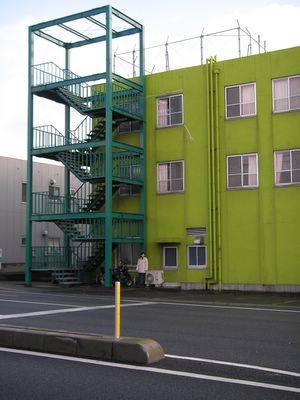
Buildings bright
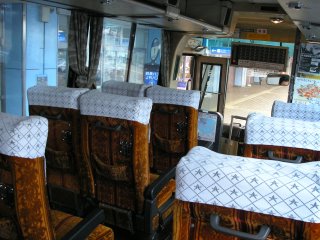 Last Friday I went to Hagi with Lindsay; we've ben planning this trip for a while now, originally Jim, my roomate and other coworker, was going to come too, but his upcoming trip back to America unfortunately overoccupied him. We set out at the ungodly hour of eight-thirty in the morning so we could get there by noon. This was not very enjoyable, nor easy, as we had had a nicely boisterous bounenkai the night before. Upon arrival in Yamaguchi city we changed from the uncomfortable and reasonably crowded local train to being the only passengers on a richly upholstered bus. After a pleasant and nap-filled journey through the beautiful countryside we arrived in Hagi. I was immediately taken with the city, aside from its pottery, historical significance and abundance of temples, it had forest covered hills. I felt like I was back in Bellingham, it was beautiful. If there was a Nova branch in Hagi, I wouldn't have to think about transferring.
Last Friday I went to Hagi with Lindsay; we've ben planning this trip for a while now, originally Jim, my roomate and other coworker, was going to come too, but his upcoming trip back to America unfortunately overoccupied him. We set out at the ungodly hour of eight-thirty in the morning so we could get there by noon. This was not very enjoyable, nor easy, as we had had a nicely boisterous bounenkai the night before. Upon arrival in Yamaguchi city we changed from the uncomfortable and reasonably crowded local train to being the only passengers on a richly upholstered bus. After a pleasant and nap-filled journey through the beautiful countryside we arrived in Hagi. I was immediately taken with the city, aside from its pottery, historical significance and abundance of temples, it had forest covered hills. I felt like I was back in Bellingham, it was beautiful. If there was a Nova branch in Hagi, I wouldn't have to think about transferring. 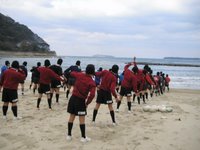 We had ramen for lunch, then struck out for the castle, pausing at temples along the way. Walking down the beach we found ourselves observing rugby practice in the bitter cold and wind. I admire the teams dedication, but envy them none.
We had ramen for lunch, then struck out for the castle, pausing at temples along the way. Walking down the beach we found ourselves observing rugby practice in the bitter cold and wind. I admire the teams dedication, but envy them none.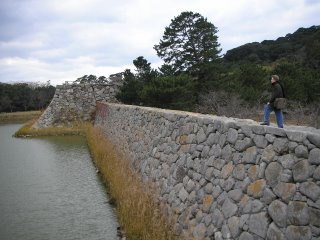 Even with just walls and a moat (two acually), the castle was still quite impressive, and the walls were good for looking out from. From there it was a look at the castle shrine and a hike to the top of the mountain (read hill) where there was a view and more ruins. The climb, while short (the hill is 730m high), proved good exercise. It was worth it though, the view from the top was amazing.
Even with just walls and a moat (two acually), the castle was still quite impressive, and the walls were good for looking out from. From there it was a look at the castle shrine and a hike to the top of the mountain (read hill) where there was a view and more ruins. The climb, while short (the hill is 730m high), proved good exercise. It was worth it though, the view from the top was amazing.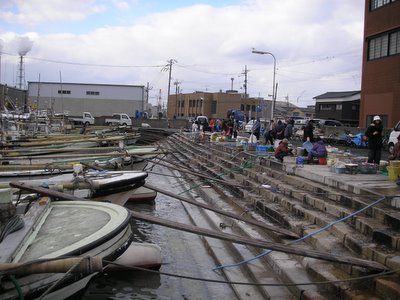
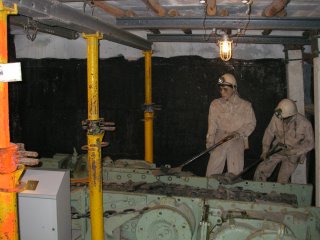
Today, I had a fascinating conversation with a student in the Voice room (that being the place that students can go fi they don't want a lesson, but just want to practice their English skillis in an informal, conversational environment). It started with being asked what I had done in Ube during my stay here. As part of my answer I mentioned my trip to Tokiwa, and I commentend on the mining museum I had heard about (see comment on "Public sculpture beautifies cities"). I told the two students in the room at the time that I was clueless about the existence and location of this museum. They replied that, they two were unaware of it, but one of them proceeded to tell me about the mining history of Ube. Apparently Ube was once a great coal mining town, however this was sixty or so years ago and the mining was accomplished through the imported forced labor of Koreans living in cramped conditions near the beach. Living near the beach was a requirement, as most of the mining was done in tunnels dug underneath the ocean; it was very dangerous work, especially because of the breathing tubes. Because of the lack of oxygen in these underwater tunnels, gigantic tubes were constructed, running from the mine to above the surface of the water. However the construction of these tubes was poor, and from time to time they would leak, neither did they extend far above the water's surface so the winds could kick up the waves over the tops of the tubes. Water would rush down into the tunnels and drown many Koreans, but more would be brought over soon. She then told me that in recent years "a Japanese man felt pity for the Koreans" and made a trip over to Korea to speak with the surviving laborers and their families and now once a year a delegation comes from Korea to hold a memorial Buddhist prayer service. She continued on to tell me from the train, between the stops of Kusae and Tokiwa, one can still see the tops of two of these breathing shafts rising out of the water.
Both students then commented on how no compensation has been paid by Japan to any of the countries from which it culled laborers. This woman who was born in Seoul to a Japanese soldier during the occupation then insisted on telling me about the rainbows she had seen yesterday, and about how difficult it can be to teach singing to children from the countryside.
 When it became clear that he was being of little help to me he decided to follow me outside and walk with me. He was in his mid-twenties, wearing a shiny red track suit, and, I think a visor. In the short conversation we had, he told me he was an iindependent fashion designer and travelled to Korea, Hong Kong, etc. However, instead of taking me to the highway, as I had hoped, he walked me and my bike to the local koban, or police box/mini-station. Inside he helped explain the situation to the four officers there, who all clustered around up to the counter to see what was up. I added that I was lost (in Japanese) to which one officer replied, "I'm lost", he may have been correcting my pronunciation, or makiing a joke, but either way I was confused. I wrote down my address for the officers and three of them came outside with me, the man in the track suit left, saying (in Japanese) not to worry, and that Japanese police were kind. Nice of him to say so, but not really necessary. The polic then held my bike and parked it by the police station, because I had been drinking, saying I could get it tomorrow. Oddly, they didn't check the registration. Then three of them hopped in a police car with me and gave me a ride home, taking my phone number on the way and made some general small talk. I told them that I had left my passport in my apartment, and could go get it, but they shrugged it off. They dropped me off at my door and told me to have a good night. Not an unpleasant experience, but, still an inconvenience; I had to spend a bunch of money on a taxi to work today, and tomorrow I need to go find my bike.
When it became clear that he was being of little help to me he decided to follow me outside and walk with me. He was in his mid-twenties, wearing a shiny red track suit, and, I think a visor. In the short conversation we had, he told me he was an iindependent fashion designer and travelled to Korea, Hong Kong, etc. However, instead of taking me to the highway, as I had hoped, he walked me and my bike to the local koban, or police box/mini-station. Inside he helped explain the situation to the four officers there, who all clustered around up to the counter to see what was up. I added that I was lost (in Japanese) to which one officer replied, "I'm lost", he may have been correcting my pronunciation, or makiing a joke, but either way I was confused. I wrote down my address for the officers and three of them came outside with me, the man in the track suit left, saying (in Japanese) not to worry, and that Japanese police were kind. Nice of him to say so, but not really necessary. The polic then held my bike and parked it by the police station, because I had been drinking, saying I could get it tomorrow. Oddly, they didn't check the registration. Then three of them hopped in a police car with me and gave me a ride home, taking my phone number on the way and made some general small talk. I told them that I had left my passport in my apartment, and could go get it, but they shrugged it off. They dropped me off at my door and told me to have a good night. Not an unpleasant experience, but, still an inconvenience; I had to spend a bunch of money on a taxi to work today, and tomorrow I need to go find my bike.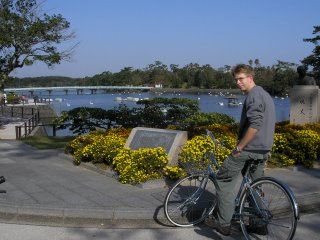
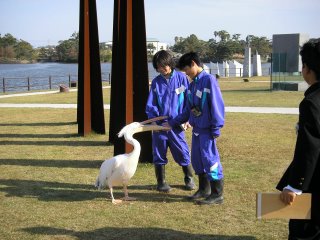 However, shortly after this picture was taken I observed a man bring his baby over to the pelicans, to "say hello" or some such apparently. Speaking of saying hello, the school kids well always yell "Harro!" at me or my coworkers (collectively, "them white folks" or gaijin) and "Shi yuu!" as we leave. Unless they are younger, then it is a coin toss between "Harro!" and running away.
However, shortly after this picture was taken I observed a man bring his baby over to the pelicans, to "say hello" or some such apparently. Speaking of saying hello, the school kids well always yell "Harro!" at me or my coworkers (collectively, "them white folks" or gaijin) and "Shi yuu!" as we leave. Unless they are younger, then it is a coin toss between "Harro!" and running away.
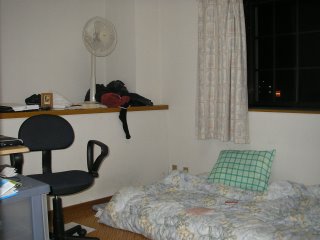 And there we are. First of many I suppose. But, I digress. The requisite steps to get the phone were certainly interesting, if not simultaneously boring. First was getting there certificate that says that I'm registered to get an alien registration card; while sitting in the poorly ventilated city office waiting for some of the paperwork to go through, an elderly man with a limp and one foot wrapped in a plastic bag came up to me and said some unintelligible things, then wandered over and sat down next to my roomate and spoke at him for a while. After he left, I asked what was up and my roomate told me that apparently he had fought the Americans in the Philipines in World War II. It's amazing to think of meeting war vetrans in another country that fought against our parents generation. The rest of the story is the boring part. I waited in the bank for forty five minutes for my account to be processed. Although the clerk did point to the appropriate prhases in his phrase book, so that I would know what he was talking about.
And there we are. First of many I suppose. But, I digress. The requisite steps to get the phone were certainly interesting, if not simultaneously boring. First was getting there certificate that says that I'm registered to get an alien registration card; while sitting in the poorly ventilated city office waiting for some of the paperwork to go through, an elderly man with a limp and one foot wrapped in a plastic bag came up to me and said some unintelligible things, then wandered over and sat down next to my roomate and spoke at him for a while. After he left, I asked what was up and my roomate told me that apparently he had fought the Americans in the Philipines in World War II. It's amazing to think of meeting war vetrans in another country that fought against our parents generation. The rest of the story is the boring part. I waited in the bank for forty five minutes for my account to be processed. Although the clerk did point to the appropriate prhases in his phrase book, so that I would know what he was talking about.